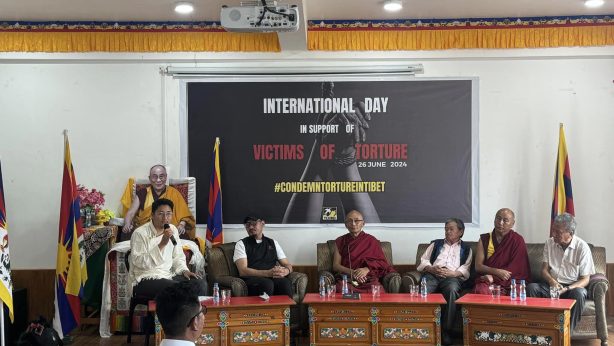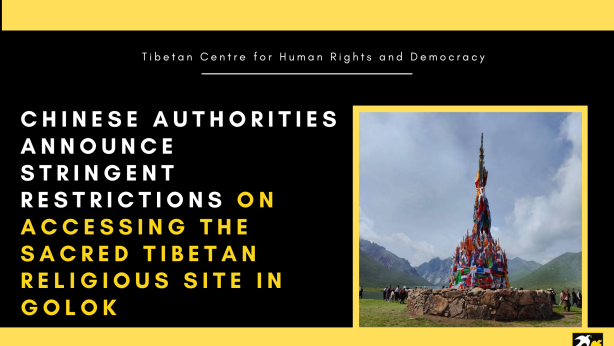Two monks sentenced to 3 yrs in prison for holding prayers for self-immolator
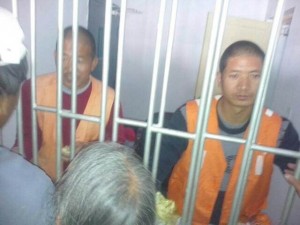
The relentless crackdown on self-immolation protests in Tibet continued when Chinese authorities sentenced two Tibetan monks to three years in prison for holding religious rituals and prayer services for a Tibetan man who died of self-immolation protest in November last year in Kangtsa Township in Yadzi (Ch: Xunhua) Salar Autonomous County in Tsoshar (Ch: Haidong) Prefecture, Qinghai Province. The Chinese authorities deemed this exercise of the monks’ fundamental rights criminal pursuant to a 2012 guideline on handling self-immolations.
Wangchen Norbu, 25, died during a self-immolation protest on 19 November last year. As he burned, Wangchen Norbu called for an end to Chinese repression and demanded the return of His Holiness the Dalai Lama to Tibet, freedom in Tibet, and the release of the 11th Panchen Lama, and all the Tibetan political prisoners.
On 19 Nov 2012, the day Wangchen Norbu died of self-immolation protest, monks from Beudo Monastery held prayers and necessary religious rituals for the deceased.
According to information received by TCHRD, on 18 April 2013, the Yazi (Ch: Xunhua) County People’s Court sentenced Tsondue, about 27, and Gedun Tsultrim, about 30, both monks from Beudo Monastery located in Beudo (Ch: Wendu) Township, to three years in prison.
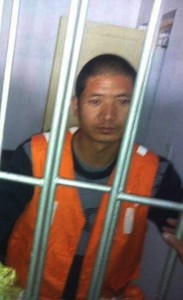
Two days after the self-immolation, on 21 November 2012, the County Public Security Bureau (PSB) officers detained Tsondue and Gedun Tsultrim during a standoff between police and local Tibetans including monks from Beudo and surrounding monasteries at Segye Nyaga, a place near Kangtsa Township. The standoff was provoked by a group of County government officials and PSB officers who stopped the local Tibetans from visiting Wangchen Norbu’s house after the self-immolation to offer condolences and prayers. Unable to move forward, the monks stayed put at Sergye Nagya and began a prayer service there despite opposition from the government and police officials. At the time, Tsondue led the prayers as the chief chant master (Tib: Umze). The police then arrested and interrogated Tsondue and Gedun Tsultrim along with an unknown number of monks and lay people at the scene.
For the next five months, both monks were secretly detained and their family members were denied any information about their whereabouts or wellbeing. Sources told TCHRD that family members of the monks, accompanied by lamas of Beudo Monastery and other local community leaders approached the County government office at least five times to enquire about the monks’ whereabouts and condition. During these visits, family members of both monks urged the authorities to release them as they had committed no crime, save for holding prayers for the deceased as is expected of monks. In response to repeated requests, the government officials had said that the monks were being held in Yazi County but they refused to allow any meetings with the detained monks.
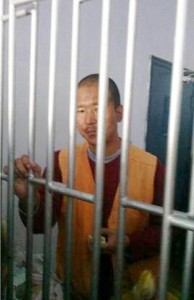
Sources told TCHRD that Tsondue who hails from Chukyel Gongma Village in Beudo Township was charged with being the main organiser of prayer services at Beudo Monastery on 19 November and for acting as the chief chantmaster during a prayer service held in defiance of law enforcement agencies on 21 November.
Gedun Tsultrim, of Shongyul Village in Beudo Township, was charged with helping monks and lay Tibetans organize their visit to Wangchen Norbu’s house on 21 November to offer condolences and prayers. His charges included collecting donations on behalf of the deceased’s family members and for arranging vehicles for local Tibetans who attempted to visit the deceased’s home.
After about five months of secret detention, both monks were sentenced on 18 April at a trial attended by some family members and relatives. Apparently the authorities had sent a notice to both families informing them about the trial date. As word spread, many local Tibetans both monks and lay came out in droves to the County courthouse but only some immediate family members and relatives were permitted to observe the trial.
Beudo Monastery, one of the largest monasteries in the region, is situated just 4 km off the highway stretching from Yazi County to Rebkong (Ch: Tongren) County, and about 25 km from Yazi town.
In December 2012, China’s top judicial and law-enforcement authorities issued a guideline called “Opinion on Handling Self-Immolation Cases in Tibetan Areas in Accordance with the Law,” which is aimed directly at criminalizing a wide variety of activities related to the self-immolation protests. This guideline has now become a source of many arbitrary arrests and detention as well as illegal sentencing linked to self-immolation protests. According to the controversial guideline, illegal criminal activities include gathering together to hold prayer services or cremation rituals for those who died in self-immolation protests. Likewise, it is illegal and criminal to “summon a group to mourn or collect funds for a self-immolator.” According to the logic of the guideline, these activities “disrupt social order, public order, or traffic order” and therefore, “shall be held criminally liable in accordance with the law.”
Such farcical law, which criminalises such acts as holding prayer services in monasteries and temples, and offering condolences to a deceased’s family members, clearly demonstrates the situation of religious freedom in Tibet. It also reveals China’s ‘rule by law’ where the country’s legal system is used as a tool to further the one-party state’s political objectives. Let alone international human rights law, this kind of action violates China’s Constitution, which guarantees religious freedom to its citizens.
Note:
Dui Hua Human Rights Journal, China Outlines Criminal Punishments for Tibetan Self-Immolations, 5 December 2012, available at http://www.duihuahrjournal.org/2012/12/china-outlines-criminal-punishments-for.html

